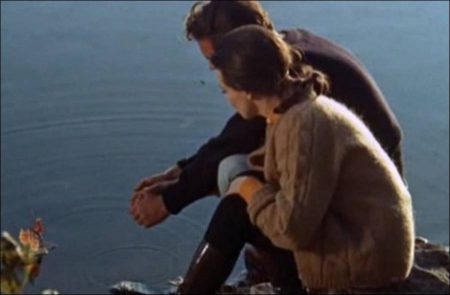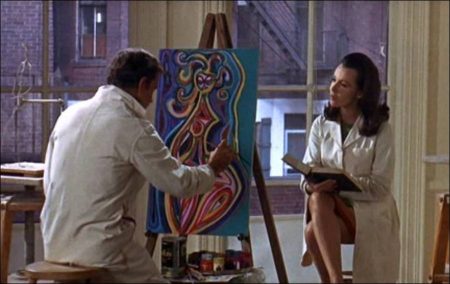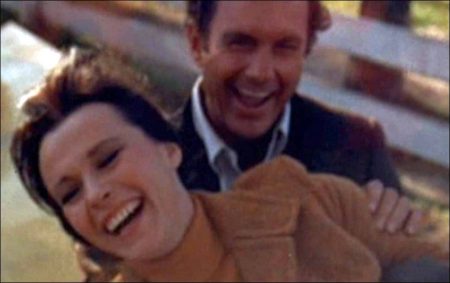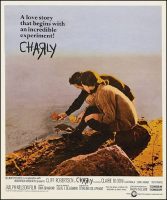Taglines: A love story that begins with an incredible experiment!
Charly is an adult male with a cognitive disability, struggling to survive in the modern world. His frequent attempts at learning, reading and writing prove difficult, and he is the subject of cruel pranks at the bakery where he does minor janitorial work. His teacher, Mrs. Kinnian, enrolls Charly in a clinical study where he is observed by a surgeon and a psychologist who have Charly “race” a mouse named Algernon, solving mazes.
Algernon is usually the winner, thanks to an experiment involving brain proteins that greatly raised his intelligence. The experiment proceeds with surgery on Charly, who at first does not seem affected. However, he quickly becomes more logically advanced, soon becoming a pure genius. Emotional and intra-personal consequences are involved as Charly and his teacher become increasingly attached to one another. But when Charly gradually suspects the consequences of the experiment, he struggles with whether or not the procedure was a good idea.
Charly (marketed and stylized as CHAЯLY) is a 1968 American drama film, directed and produced by Ralph Nelson, and written by Stirling Silliphant. It was based on Flowers for Algernon, a science fiction short story (1958) and subsequent novel (1966) by Daniel Keyes.
The film stars Cliff Robertson as Charly Gordon, an intellectually disabled adult who is selected by two doctors to undergo a surgical procedure that triples his IQ as it did for Algernon, a laboratory mouse who also underwent the same procedure; additional roles are co-played by Claire Bloom, Lilia Skala, Leon Janney, and Dick Van Patten. Robertson was reprising his previous portrayal of the same role in a 1961 television adaptation, “The Two Worlds of Charlie Gordon”, an episode of the anthology series The United States Steel Hour. The film received positive reviews, and was a success at the box office and, a generation later, in home media sales.
About the Story
Charly Gordon (Cliff Robertson) is a mentally handicapped man with a strong desire to make himself smarter. For the past two years, he has attended night school in Boston, learning to read and write from Alice Kinnian (Claire Bloom). However, his spelling and penmanship remain poor, and he is unable to spell his own name. He works as a janitor in a bakery, where his co-workers frequently amuse themselves at his expense, and enjoys playing with children at a playground when not at work.
Alice takes Charly to see Dr. Richard Nemur and Dr. Anna Straus, two researchers who have increased the intelligence of laboratory mice with a new surgical procedure and are now looking for a human test subject. To assess Charly’s suitability as a candidate, they put him through a battery of aptitude tests and have him race against Algernon, a mouse who has had the procedure. Algernon physically runs through a maze while Charly uses a pencil to trace his way through a diagram of the same maze. Charly consistently loses the races, but is nevertheless given the experimental surgery.
After the surgery, Charly is initially angered at not immediately becoming smarter and still loses to Algernon. Eventually, he beats Algernon and his intelligence begins to increase rapidly. Charly’s co-workers tell him to use a machine that they think is too complex for him to operate, hoping that he will break it so they can have the day off.
When he successfully works the machine, though, they become displeased that he is now too intelligent to fall for their jokes and get him fired from the bakery. Alice continues teaching him, but he soon surpasses her. Nemur and Straus argue over the importance of Charly’s emotional development, with Straus pointing to the drawings and paintings he has created (including several abstract nude figures of Alice) as evidence of his need to mature in this respect.
Charly becomes infatuated with Alice and questions whether she loves her fiancé. He follows her to her apartment one night, declaring his love for her, but flees after she sharply rejects his sexual advances. He briefly rebels by immersing himself in the counterculture – riding a motorcycle, kissing a series of different women, smoking and dancing – but eventually returns to Boston. The two reconcile, and both realize that they want to be together and consider marriage.
Four weeks later, Nemur and Straus present their research at a convention of scientists, playing back film footage of Charly’s aptitude tests before bringing him out for a question-and-answer session. Angry and aggressive over seeing the audience laugh at his past behavior, he reveals that Algernon has died after regressing to his original mental state – a fact that had been withheld from him – and that he expects to lose his own enhanced intelligence as well. Charly flees the convention, but hallucinates seeing his former self everywhere he goes. Stopping at a bar for a drink, he sees a mentally handicapped busboy drop a tray of glasses; the other customers laugh at the incident, but stop when Charly silently begins to help the busboy clean up the mess.
Charly (1968)
Directed by: Ralph Nelson
Starring: Cliff Robertson, Claire Bloom, Leon Janney, Lilia Skala, Dick Van Patten, Edward McNally, Ruth White, Barney Martin, William Dwyer, Dan Morgan, Randee Lynne Jensen, Frank Dolan
Screenplay by: Stirling Silliphant
Production Design by: John DeCuir
Cinematography by: Arthur J. Ornitz
Film Editing by: Fredric Steinkamp
Costume Design by: Hazel Roy
Art Direction by: Charles Rosen
Music by: Ravi Shankar
MPAA Rating: None.
Distributed by: Cinerama Releasing Corporation
Release Date: June 28, 1968 (Berlin), September 23, 1968 (New York City)
Views: 267



